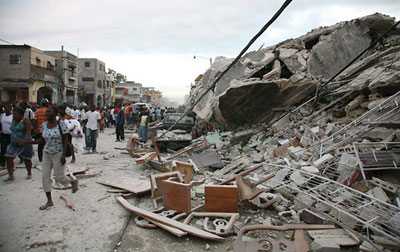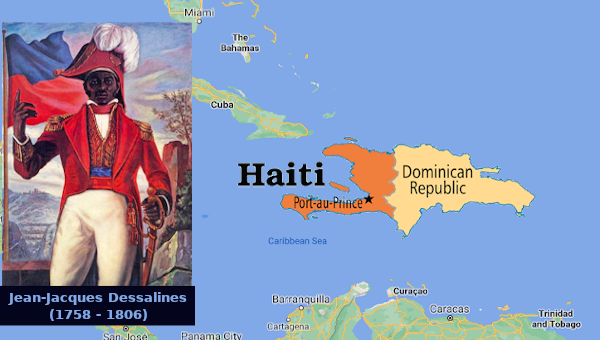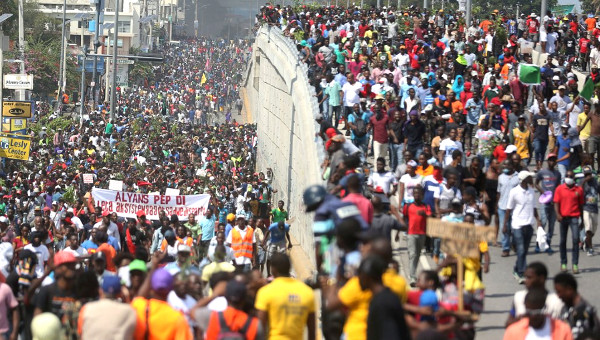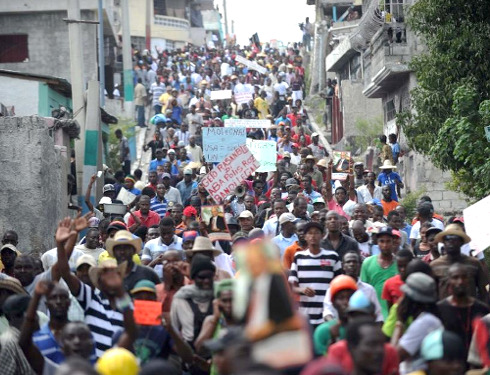Our Role in Haiti’s Plight
Any large city in the world would have suffered extensive damage from an earthquake on the scale of the one that ravaged Haiti’s capital city on Tuesday afternoon, but it’s no accident that so much of Port-au-Prince now looks like a war zone. Much of the devastation wreaked by this latest and most calamitous disaster to befall Haiti is best understood as another thoroughly manmade outcome of a long and ugly historical sequence.
The country has faced more than its fair share of catastrophes. Hundreds died in Port-au-Prince in an earthquake back in June 1770, and the huge earthquake of 7 May 1842 may have killed 10,000 in the northern city of Cap Haitien alone. Hurricanes batter the island on a regular basis, most recently in 2004 and again in 2008; the storms of September 2008 flooded the town of Gonaïves and swept away much of its flimsy infrastructure, killing more than a thousand people and destroying many thousands of homes. The full scale of the destruction resulting from this earthquake may not become clear for several weeks. Even minimal repairs will take years to complete, and the long-term impact is incalculable.
 What is already all too clear, however, is the fact that this impact will be the result of an even longer-term history of deliberate impoverishment and disempowerment. Haiti is routinely described as the “poorest country in the western hemisphere.” This poverty is the direct legacy of perhaps the most brutal system of colonial exploitation in world history, compounded by decades of systematic postcolonial oppression.
What is already all too clear, however, is the fact that this impact will be the result of an even longer-term history of deliberate impoverishment and disempowerment. Haiti is routinely described as the “poorest country in the western hemisphere.” This poverty is the direct legacy of perhaps the most brutal system of colonial exploitation in world history, compounded by decades of systematic postcolonial oppression.
The noble “international community” which is currently scrambling to send its “humanitarian aid” to Haiti is largely responsible for the extent of the suffering it now aims to reduce. Ever since the U.S. invaded and occupied the country in 1915, every serious political attempt to allow Haiti’s people to move (in former president Jean-Bertrand Aristide’s phrase) “from absolute misery to a dignified poverty” has been violently and deliberately blocked by the U.S. government and some of its allies.
Aristide’s own government (elected by some 75% of the electorate) was the latest victim of such interference, when it was overthrown by an internationally sponsored coup in 2004 that killed several thousand people and left much of the population smouldering in resentment. The UN has subsequently maintained a large and enormously expensive stabilization and pacification force in the country.
Haiti is now a country where, according to the best available study, around 75% of the population “lives on less than $2 per day, and 56% – four and a half million people – live on less than $1 per day.” Decades of neoliberal “adjustment” and neo-imperial intervention have robbed its government of any significant capacity to invest in its people or to regulate its economy. Punitive international trade and financial arrangements ensure that such destitution and impotence will remain a structural fact of Haitian life for the foreseeable future.
The Neoliberal Assault
It is this poverty and powerlessness that account for the full scale of the horror in Port-au-Prince today. Since the late 1970s, relentless neoliberal assault on Haiti’s agrarian economy has forced tens of thousands of small farmers into overcrowded urban slums. Although there are no reliable statistics, hundreds of thousands of Port-au-Prince residents now live in desperately sub-standard informal housing, often perched precariously on the side of deforested ravines. The selection of the people living in such places and conditions is itself no more “natural” or accidental than the extent of the injuries they have suffered.
As Brian Concannon, the director of the Institute for Justice and Democracy in Haiti, points out:
“Those people got there because they or their parents were intentionally pushed out of the countryside by aid and trade policies specifically designed to create a large captive and therefore exploitable labour force in the cities; by definition they are people who would not be able to afford to build earthquake resistant houses.”
Meanwhile the city’s basic infrastructure – running water, electricity, roads, etc – remains woefully inadequate, often non-existent. The government’s ability to mobilize any sort of disaster relief is next to nil.
The international community has been effectively ruling Haiti since the 2004 coup. The same countries scrambling to send emergency help to Haiti now, however, have during the last five years consistently voted against any extension of the UN mission’s mandate beyond its immediate military purpose. Proposals to divert some of this “investment” toward poverty reduction or agrarian development have been blocked, in keeping with the long-term patterns that continue to shape the distribution of international “aid.”
The same storms that killed so many in 2008 hit Cuba just as hard but killed only four people. Cuba has escaped the worst effects of neoliberal “reform,” and its government retains a capacity to defend its people from disaster. If we are serious about helping Haiti through this latest crisis then we should take this comparative point on board. Along with sending emergency relief, we should ask what we can do to facilitate the self-empowerment of Haiti’s people and public institutions. If we are serious about helping we need to stop trying to control Haiti’s government, to pacify its citizens, and to exploit its economy. And then we need to start paying for at least some of the damage we’ve already done. •
This article first appeared on The Guardian website.
Urgent Appeal for the People of Haiti
From the Canada Haiti Action Network
January 14, 2010 — Two days ago at 5 pm local time, a powerful magnitude-7 earthquake struck in Haiti. It was centred near the capital city Port-au-Prince and has caused massive destruction.
The Canada Haiti Action Network urges Canadians and others around the world to contribute generously to emergency relief.
You can contribute to the Haitian Red Cross through its international partners in the International Red Cross. Contributions are tax deductible. The Canadian Red Cross is at:
www.redcross.ca. We also encourage contributions to the following organizations. Remember that you must provide a name and return mailing address in order to receive a tax-deductible receipt:
- Zanmi Lasante/Partners in Health – medical center is located in the Central Plateau of Haiti and delivers healthcare through a network of clinics in that region of the country. It also trains Haitians as doctors and health professionals. The health center survived the earthquake and is moving to deliver aid to the disaster zone. Donations in the U.S. are tax deductible. To donate, go to: www.pih.org By mail, “Haiti Earthquake Relief” in cheque memo line to:
Partners In Health
P.O. Box 845578
Boston, MA 02284-5578 - Doctors Without Borders/Medecins sans frontières – operates clinics in Port au Prince and surrounding neighbourhoods. It has expertise in disaster relief. Donations in Canada and the U.S. are tax deductible. Go to: www.msf.ca. By mail, “Haiti Earthquake” in memo line:
Doctors Without Borders
720 Spadina Ave, Suite 402
Toronto, ON M5S 2P9 - Sawatzky Family Foundation-SOPUDEP School – is a pioneering school in Petionville with an enrolment of 600 students from elementary to senior high school grades. The school was not in session when the disaster struck; we do not know if the building survived. The resources of the school and its teachers are being mobilized to assist the neighbouring population. The Sawatzky Family Foundation is a registered charity in Canada and issues tax deductible receipts. Go to: www.sopudep.org/donate By mail:
The Sawatzky Family Foundation
PO Box 626, 25 Peter Street North
Orillia, Ontario, Canada L3V 6K5 - Haiti Emergency Relief Fund – In association with the Haiti Action Committee in San Francisco/Bay Area, this fund delivers resources directly to grassroots organizations in Haiti. It was founded 04 following the 2004 coup d’etat that forced the elected president of Haiti, Jean-Bertrand Aristide, from office and imposed a two-year regime of human rights violations whose consequence continues today. Go to: www.haitiaction.net By mail:
Haiti Emergency Relief Fund/EBSC
East Bay Sanctuary Covenant
2362 Bancroft Way
Berkeley, CA 94704 - For more information, including telephone contact, go to the website of the Canada Haiti Action Network at canadahaitiaction.ca and Toronto Haiti Action Committee (THAC).





